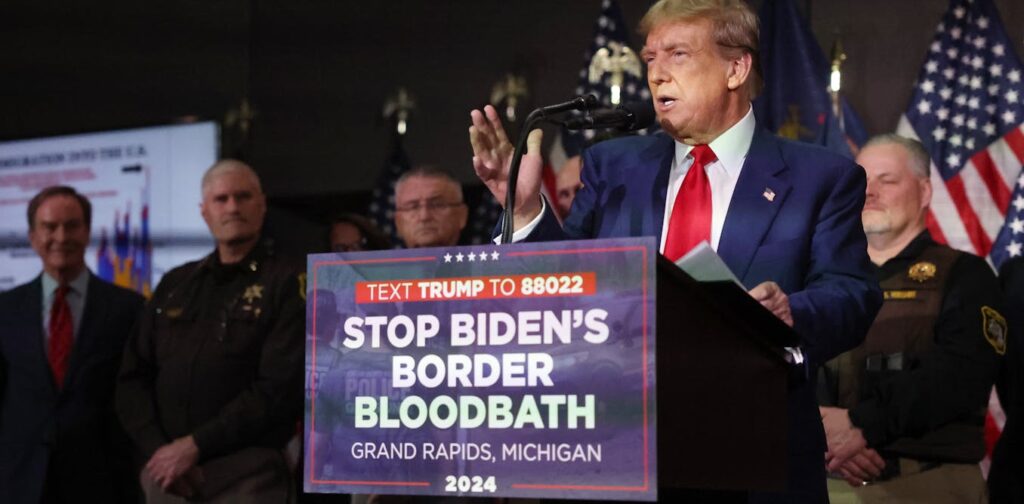Donald Trump’s political career has been characterized by a unique and often controversial rhetorical style. Since 2015, his rhetoric has evolved significantly, gaining attention for his direct and often violent tone.
An analysis of his speeches reveals how his language has shaped both his political persona and the broader landscape of American politics.
We are political scientists who analyzed Trump’s campaign and presidential speeches from 2015 to 2024. One of the most notable trends in Trump’s rhetoric is the sharp increase in his use of violent vocabulary. The percentage of President Trump’s speeches that use words related to violence rose from about 0.6% in 2016 to 1.6% in 2024. For comparison, 40 randomly selected weekly radio speeches by Barack Obama contained 0.79% of violent language.
In the nine years since his first campaign in 2015, Trump’s speeches have increasingly included words and phrases related to crime and military conflict. For example, in March 2024, Trump said that if he was not re-elected in November, “it would be a disaster for the country.”
By 2024, Trump’s use of violent language exceeded that of nearly every other democratic politician we considered and approached that of authoritarians such as Kim Jong Un and Fidel Castro.
This surge in violent rhetoric is not associated with any major external event such as war. President Trump has focused his message on violent crime, especially in American cities, even though crime rates are declining. Repeated references to “murderers, rapists and thugs” paint a picture of a nation under siege and raise concerns among supporters.
At the same time, he casts himself as a strong leader capable of confronting these perceived threats.
President Trump was indicted on June 13, 2023, on 37 criminal charges related to his handling of classified documents, telling his supporters, “I’m the only one who can save this country.”
The language of economic and public services declines
President Trump’s rhetoric has become more violent, but he has also moved away from traditional political debates about economic performance and public services. Early in his political career, Trump mentioned economic issues fairly often, capitalizing on concerns about jobs, trade, and prosperity. However, over time, his interest in economics decreased significantly.
This trend is not limited to Trump. Both Democratic and Republican candidates have used less economic language in their speeches since at least 2012.
But President Trump’s withdrawal from economic discussions is particularly notable. He has not always focused as much as other presidential candidates on providing public services such as health care, housing and transportation. His speeches now include fewer words like “health care,” “education,” and “parenting.”
Instead, his rhetoric has increasingly focused on identity politics and cultural issues, reflecting broader changes in American political discourse.
Moving away from inclusive languages
Populism is often characterized by a focus on ‘the people’ versus ‘the elites’, with politicians often claiming to be the defenders of ordinary people against corrupt insiders. Early in his political career, Mr. Trump frequently used such inclusive language, evoking “the people.”
But since then, his rhetoric has shifted toward so-called “xenophobic populism,” with frequent attacks on political elites, immigrants and members of the media. The debate between Trump and Kamala Harris on September 10, 2024, featured many such examples, the most famous of which was about immigrants eating dogs.
This shift from inclusive to exclusionary rhetoric defines politics as a battle between “us” and “them,” with President Trump positioning himself as a protector of ordinary Americans from outside threats. reflects a broader strategy of positioning.
Trump’s oratory style has changed significantly since he began his first presidential campaign. During his first election in 2015-2016, his language became more inclusive, increasing his use of “we” and “the people” and referring to elites and social groups he viewed negatively (“we” and “the people”). references to them have decreased.
However, once in office, his speeches displayed a more combative style. His use of violent language skyrocketed, and references to “them” became more frequent.
This evolution suggests that Trump’s rhetoric is malleable, changing depending on the political context and the audience he seeks to engage. The increased use of inflammatory language and expletives since taking office stands in contrast to the more measured tone he adopted during the 2016 election campaign.
President Trump said on September 29, 2024 in Erie, Pennsylvania, “One truly violent day would end crime in America.”
Violent attack on the elite
Mr. Trump’s rhetoric can be more fully understood by comparing it with that of other U.S. presidential candidates since 1952 and with world leaders, both democratic and authoritarian.
The only recent presidential candidates who have expressed a level of violence comparable to President Trump’s in 2024 are Republican George W. Bush in 2004 and Democrat John Kerry. But while Mr. Bush and Mr. Kerry were discussing the ongoing Iraq war, which at the time had caused hundreds of U.S. military casualties. In 2017, Trump’s violent claims had no connection to actual events or statistics.
In terms of populism, Trump stands out from other leaders with his aggressive attacks on elites. Since starting his political career in 2016, Trump has spoken of his intention to “drain the swamp” in reference to corruption among political elites. Populist candidates often criticize political insiders, but Mr. Trump’s frequency of criticism exceeds that of recent U.S. presidential candidates.
For example, Trump’s 2024 speech included far more references to corrupt elites than his predecessors, revealing a deep obsession with exclusionary populist discourse.
While a politician’s rhetoric does not always predict his or her actions, President Trump’s growing obsession with violent language and populist themes suggests that he will continue to do so, whether as president or in defeat. may give insight into future approaches. As political scientists, we believe that the rise of such rhetoric is worth monitoring closely because of its potential impact on the broader political landscape.

